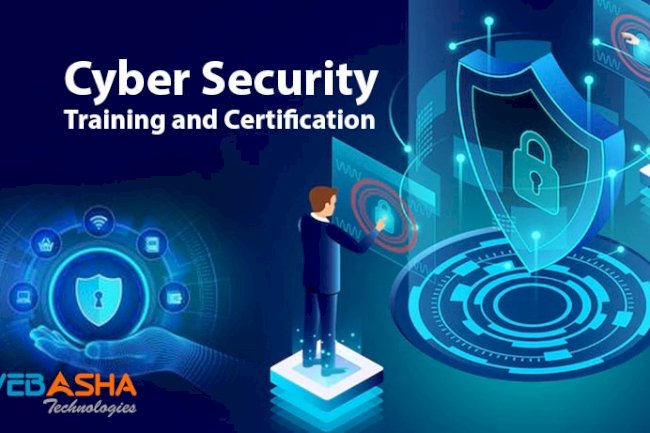Top Cybersecurity Certifications for Beginners in 2025 | Best Entry-Level Certifications to Start Your Cybersecurity Career
Cybersecurity certifications are a great way for beginners to validate their skills and start a successful career in the field. In 2025, some of the best entry-level cybersecurity certifications include CompTIA Security+, Certified Ethical Hacker (CEH), Cisco CyberOps Associate, GIAC Security Essentials (GSEC), and Microsoft SC-900. These certifications help learners build a strong foundation in security concepts, network security, ethical hacking, incident response, and cloud security. Additionally, certifications like Certified SOC Analyst (CSA) and Certified Information Systems Security Professional (CISSP - Associate Level) provide hands-on skills for real-world cybersecurity challenges. WebAsha Technologies offers training programs to help beginners achieve these certifications and gain practical experience in cybersecurity. By obtaining the right certifications, beginners can enhance their job prospects and enter the field with confidence.

Table of Contents
- Why Are Cybersecurity Certifications Important for Beginners?
- Best Cybersecurity Certifications for Beginners in 2025
- Comparison of Top Cybersecurity Certifications
- How to Choose the Right Cybersecurity Certification?
- Conclusion
- FAQs
Why Are Cybersecurity Certifications Important for Beginners?
Cybersecurity is a rapidly growing field, and companies seek skilled professionals to protect their data and networks. For beginners, certifications act as a stepping stone to validate their knowledge, gain hands-on skills, and increase employability. Certifications demonstrate expertise and commitment to cybersecurity, even without prior job experience.
Best Cybersecurity Certifications for Beginners in 2025
Below is a list of the top cybersecurity certifications for beginners in 2025, along with their details.
1. CompTIA Security+
- Why Choose It? It is the most recognized entry-level certification in cybersecurity.
- What It Covers? Network security, cryptography, threat management, risk management.
- Job Roles? Security Analyst, SOC Analyst, Cybersecurity Specialist.
- Exam Code: SY0-701 (Latest Version).
2. Certified Ethical Hacker (CEH) - EC-Council
- Why Choose It? Best certification for ethical hacking and penetration testing.
- What It Covers? Ethical hacking techniques, penetration testing, vulnerability assessment.
- Job Roles? Ethical Hacker, Penetration Tester, Security Analyst.
- Exam Code: CEH v12.
3. Cisco Certified CyberOps Associate
- Why Choose It? Best certification for SOC (Security Operations Center) roles.
- What It Covers? Cybersecurity operations, threat detection, incident handling.
- Job Roles? SOC Analyst, Cybersecurity Analyst, Incident Responder.
- Exam Code: 200-201 CBROPS.
4. GIAC Security Essentials (GSEC)
- Why Choose It? Focuses on hands-on security skills and incident response.
- What It Covers? Network security, access control, cryptography, security operations.
- Job Roles? Security Engineer, IT Security Specialist, Incident Responder.
- Exam Code: GSEC.
5. Microsoft Certified: Security, Compliance, and Identity Fundamentals (SC-900)
- Why Choose It? Best for beginners interested in cloud security.
- What It Covers? Cloud security, compliance, risk management, identity protection.
- Job Roles? Cloud Security Analyst, Risk Analyst, Security Consultant.
- Exam Code: SC-900.
6. Certified SOC Analyst (CSA) - EC-Council
- Why Choose It? Specifically designed for beginners who want to work in a SOC team.
- What It Covers? SOC processes, SIEM tools, threat detection, incident response.
- Job Roles? SOC Analyst, Security Operations Engineer, Threat Hunter.
- Exam Code: CSA.
7. (ISC)² Certified in Cybersecurity (CC)
- Why Choose It? A new entry-level certification from (ISC)² for security beginners.
- What It Covers? Information security principles, network security, access management.
- Job Roles? Cybersecurity Technician, IT Security Specialist, Junior Analyst.
- Exam Code: CC.
8. Google Cybersecurity Certificate
- Why Choose It? A beginner-friendly, practical certification backed by Google.
- What It Covers? Security tools, incident detection, and response fundamentals.
- Job Roles? Security Analyst, IT Support Security, SOC Analyst.
- Exam Code: Google Cybersecurity Certificate.
Comparison of Top Cybersecurity Certifications
| Certification | Best For | Key Topics | Job Roles |
|---|---|---|---|
| CompTIA Security+ | General cybersecurity knowledge | Risk management, threats, cryptography | Security Analyst, SOC Analyst |
| CEH (Certified Ethical Hacker) | Ethical hacking | Penetration testing, vulnerability assessment | Ethical Hacker, Penetration Tester |
| Cisco CyberOps Associate | SOC operations | Threat detection, network security | SOC Analyst, Security Engineer |
| GSEC (GIAC Security Essentials) | Hands-on security skills | Cryptography, security operations | IT Security Specialist, Incident Responder |
| Microsoft SC-900 | Cloud security | Compliance, risk management | Cloud Security Analyst, Risk Analyst |
| Certified SOC Analyst (CSA) | Security Operations Center (SOC) | SIEM tools, threat hunting | SOC Analyst, Threat Hunter |
| (ISC)² Certified in Cybersecurity (CC) | Information security fundamentals | Access management, security principles | Cybersecurity Technician, Junior Analyst |
How to Choose the Right Cybersecurity Certification?
To select the best certification, consider the following:
- Career Goal: If you want to enter ethical hacking, choose CEH. For SOC roles, go for CyberOps Associate or CSA.
- Prior Knowledge: If you are completely new, start with CompTIA Security+ or Microsoft SC-900.
- Industry Recognition: Certifications like GSEC and (ISC)² CC are well-recognized globally.
- Job Market Demand: SOC and cloud security roles are in high demand, making CyberOps Associate and SC-900 valuable.
- Training Resources: WebAsha Technologies provides expert-led training for all these certifications.
Conclusion
Choosing the right cybersecurity certification in 2025 can significantly boost your career. Certifications like CompTIA Security+, CEH, Cisco CyberOps, GSEC, and SC-900 provide essential skills and industry recognition. Beginners should focus on certifications that align with their interests, career goals, and industry demand. WebAsha Technologies offers specialized training to help learners prepare for these certifications and gain hands-on cybersecurity experience. By obtaining the right certification, you can take the first step toward a rewarding career in cybersecurity.










![Top 10 Ethical Hackers in the World [2025]](https://www.webasha.com/blog/uploads/images/202408/image_100x75_66c2f983c207b.webp)

![[2025] Top 100+ VAPT Interview Questions and Answers](https://www.webasha.com/blog/uploads/images/image_100x75_6512b1e4b64f7.jpg)









